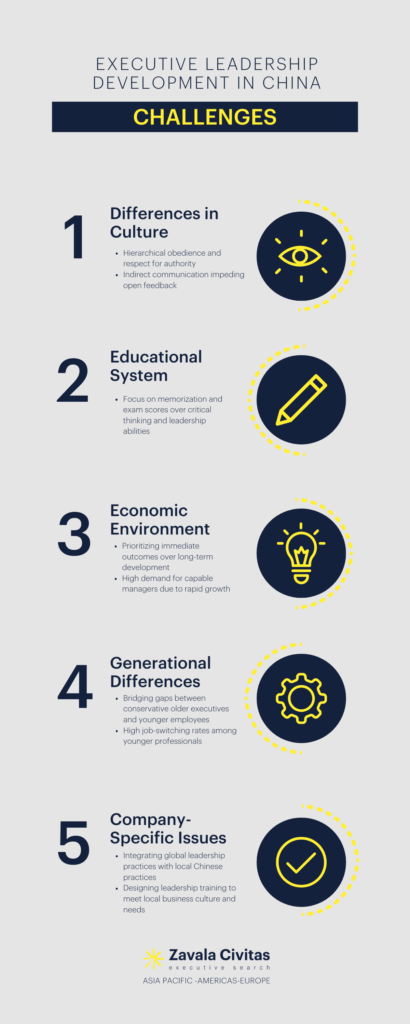China, which is among the world’s leading economies today, shows how significant executive leadership development has become within its organizations. As it is the second largest economy and a major player in global markets, China has unique issues and prospects in relation to effective leader formation. This article explains why leadership development is important in China; it also points out some of the challenges that organizations face when they want to improve their leadership strategies.

Why Leadership Development is Important in China
- Sustaining Economic Growth and Global Influence
For continued economic growth of this country, any effective leadership should be able to handle complex market dynamics as well as drive innovation. To enhance its global perception therefore, China needs leaders who will ensure economic sustainability. As Chinese firms expand globally, they heavily rely on leaders who can operate across borders, build international partnerships and compete effectively with other countries.
- Talent Management and Retention
In China, there is a high demand for skilled leaders. Continuously producing competent leaders is one way through which this gap can be addressed by these programs on developing leaders. Additionally, developmental opportunities are vital for keeping talented employees, especially young professionals who aspire to career growth.
- Adapting to Rapid Changes
The quick pace of technological advancements and digital transformation calls for leaders that can guide their organizations through these changes successfully. Moreover, flexible and strategic leadership is needed because the dynamic Chinese market experiences shifting consumer preferences along with competitive pressures from rivals.
- Cultural and Organizational Development
Leadership development plays an important role in creating a positive organizational culture that supports the values as well as strategic goals of a company involved. It encourages collaboration and innovation within companies (Avolio et al., 2009). As more Chinese firms collaborate internationally, managers need cross-cultural competence necessary for creating multinational teams as well as fostering intercultural relationships.
- Enhancing Corporate Governance
Leadership development is vital for creating leaders who can maintain corporate integrity, as well as comply with rules and regulations. This capability helps companies identify and manage risks, ensuring long-term business sustainability.
- Innovation and Competitiveness
Such leadership programs that promote creative thinking and problem-solving encourage innovation which makes companies competitive globally. Leaders with a strategic vision can align their companies with emerging opportunities and successfully navigate through highly competitive market environments.
- Social and Economic Stability
By creating jobs, promoting economic growth and corporate social responsibility, effective corporate leadership contributes to social and economic stability (Porter et al., 2003). Leadership development also supports broader national goals like enhancing economic resilience, technological advancement or global competitiveness.
- Responding to Government Policies
Given the strict regulatory environment in China, leaders here must, therefore, understand government policies as well as comply with them. Effective leadership is crucial for building strong relationships between businesses and government agencies facilitating national projects as well as initiatives.
- Building Resilient Organizations
Organizations require leaders who can maintain performance over time while recovering from potential shocks like economic downturns or pandemics or geopolitical tensions quickly enough (Avolio et al., 2009). In times of crisis powerful leaders are instrumental in maintaining stability as they drive recovery efforts forward.
- Enhancing Employee Morale and Productivity
Good leaders motivate their teams, hence leading to high productivity levels among workers (Porter et al., 2003). Strong management can also be useful in dealing with conflicts within organizations so that they have harmonious working environments where production takes place without interruptions.
Challenges of Executive Leadership Development in China
- Differences in Culture
Chinese culture is highly influenced by Confucianism and thus emphasizes hierarchical obedience, respect for authority, and collective well-being over individual achievements. However, these values can contradict Western leadership approaches that advocate flat organizational structures and individualism. Also, the Chinese way of indirect communication makes it difficult to give open and frank feedback that is indispensable for leadership development.
- Educational System
The Chinese education system has traditionally focused on memorization and exam scores rather than critical thinking and leadership abilities thus producing a workforce strong in technical competency but low in soft skills necessary for leadership.
- Economic Environment
Businesses in China are faced with an economic environment characterized by fast growth which requires organizations to prioritize immediate outcomes over long-term leadership development. Furthermore, rapid growth creates problems when companies try to get experienced leaders as there is high demand for capable managers within the country.
- Political and Legal Context
Leading an organization in China requires navigating relationships with government officials who influence business affairs through policies that keep changing every time creating strict regulations which limit the independence of company heads as well as scope of Leadership Development Programs.
- Generational Differences
There is a significant gap between older executives who could be more conservative in their approach and younger employees who are more accepting of western leadership styles and values. However, bridging this gap is not easy at all. Also, younger professionals frequently switch jobs which complicates retention and development of future leaders.
- Company-Specific Issues
Multinational companies operating in China often struggle to integrate their global leadership development practices with local Chinese practices since designing leadership training that meets specific needs of Chinese companies calls for a deep understanding of local business culture and practices.
- Training and Development Resources
In China there may be lack of high quality locally relevant leadership development programs, trainers hence while companies located in remote or less developed regions can lack sufficient resources to provide for their employees’ career growth.
However executive Leadership development specifically targeted in China poses significant challenge. The country’s rapid economic growth, its global impact and dynamic market conditions require well developed leadership that can handle complexities and drive innovations. Nevertheless, many challenges including cultural differences, education system focused on only technical skills, fast economic growth, government involvement, generation gaps and company-specific issues act as important barriers.
Dealing with these problems requires an approach that combines effective leadership development training with respect for regional cultures. It is necessary to invest in developing leaders who can navigate through market changes ensuring resilience and competitiveness. This way Chinese companies will be better placed to succeed amidst the uncertainties of global trade hence making a positive contribution towards broader social and economic stability.








